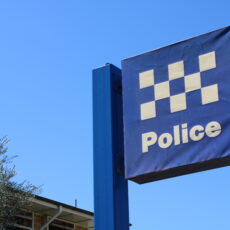Narrabri High School placed a strong focus on health this past October.
From fundraisers for Pink Up Namoi to support breast cancer awareness, to wellness initiatives to improve mental health, it’s been all hands on deck to support students and staff through what’s been a challenging few months. With local cases continuing to impact regional NSW, on-again-off again lockdowns across the Narrabri Shire, and the Department of Education’s wellbeing week, mental fitness has been one key part of the school’s October health focus.
School counsellor, Steve Rees, has rolled out a series of digital shorts unpacking a variety of topics under the mental health umbrella.
He first started the initiative while students were learning from home, after seeing how difficult the transition was for some people.
“The executive function part of your brain, the section responsible for memory and focus, can be worn down from external pressures,” Mr Rees said.
“And, in a time when the pandemic has hit closer to home than ever before, those stress levels are at an all-time high and some students were struggling to pay attention to their virtual learning.
“Adapting to new online tools and methods is even harder when that part of the brain is worn out – these videos can help put those students’ minds at ease by sharing the reasoning behind why they’re feeling these overwhelming emotions, as well as advice on what can be done to help.”
In addition to sharing guidance, the clips redirected students to useful organisations like Headspace, Kid’s Helpline and Lifeline, while they were away from school and unable to access in-person counselling.
“During lockdown, I couldn’t meet with the students who were struggling mentally,” he explained.
“So I wanted to share some of the contactless options out there.
“I also investigated different methods of communication, as part of this – in 2018, a survey found that young people preferred texting over phone calls, so I shared services that had text message options for anyone who may be nervous about picking up the phone to ring.
“Even now that lockdown is over and students can meet with me in-person again, we know that these feelings of overwhelm don’t always happen in school time, so it helps for them to be aware of the support available outside of school hours.”
Mr Rees often uses the table metaphor to help students check-in on their mental state.
“If you think of your mental health as a table, you need four stable legs in order to stand strong,” he said.
“If you only have three, you might wobble a little, but you can still stay upright – and if you only have one or two legs, there’s no way to stand on your own.
“In descending order of importance, those four legs are sleep, exercise, social interaction and diet.
“If you aren’t getting a good night’s sleep, your ability to weather the storm is dramatically impacted – and if you’re not exercising or sleeping enough, and not keeping up with friends and family, you might find yourself feeling pretty low quite often.
“My best advice is to try socialising with friends in an active way – get outside and play a sport together, or go for a walk.
“Not only will this fulfill two of your mental needs, but it’ll make you more tired so you’ll rest better that night.”
Mr Rees says it’s important not to overlook deeper mental challenges, but this foundational understanding is essential for mental wellness.
“We know there is worst case scenarios, and if you’re battling a deeper problem or specific triggers I strongly encourage you to seek medical assistance,” he said.
“But for general low mood, meeting the requirements of these four pillars will do a world of good.
“I ask the students try, for just a week, to make sure they’re going to bed at a reasonable time – the results can be profound.
“And, once that pillar is strong enough, you’ll have the energy to consider the other three areas.
“Measure your cup, consider what is required to fill it up, and experiment with these four areas.
“We can’t control how things are going with COVID, but we can control things like our sleep, exercise, social interactions and diet.”
Mr Rees’s explainer videos have been uploaded to the Narrabri High School Facebook page, and could be watched by students at home while the town was locked down.
Now that face-to-face learning is back, the clips can be watched during morning rollcall classes.
“I don’t have any in-class time, so I needed to find a way to reach the students and get some of these important mental health messages to them,” Mr Rees explained.
“I didn’t want to cut into any of the teachers’ class time, so a few minutes in the 20-minute morning rollcall fits well as it allows the staff enough time to get their admin duties out of the way before putting the video on.
“The videos are just a brief reminder about the importance of nurturing your mind, answering some of those burning questions students might have, and it is designed to support the range of other mental health resources the school has in place.
“It’s also a nice way to promote the counselling services that are available to the kids, since I don’t really get the chance to see them in-person unless they reach out to me.”
Mr Rees says the video length was also selected based on research he did into youth attention rates.
“When you’re up against apps like Netflix and TikTok, it can be hard for your message to break through the competing noise,” he said.
“Not only is there more content calling out to be consumed, making it harder to find your audience, but the attention span of today’s youth has been impacted by this information overload.
“Research shows that videos between four and eight minutes long have the best chance of getting your message across in the digital world.”
Mr Rees filmed the content during the latest COVID lockdown, rolling the clips out on social media in the weeks since.
He’s continuing to create new content and encourages suggestions from staff and students.
“I put a callout to the school, when we resumed face-to-face learning, asking what they wanted to know more about,” Mr Rees said.
“I’ve since had people coming to me, asking for videos about different aspects of mental health, which I’ve put into action in new videos.”
The digital series has been well-received so far, with overwhelmingly positive feedback.
Read more from Narrabri High School:
- Wellness Wednesdays at Narrabri High School
- Step-counting program reaches finish line
- Year 12s congratulated at final year meeting










